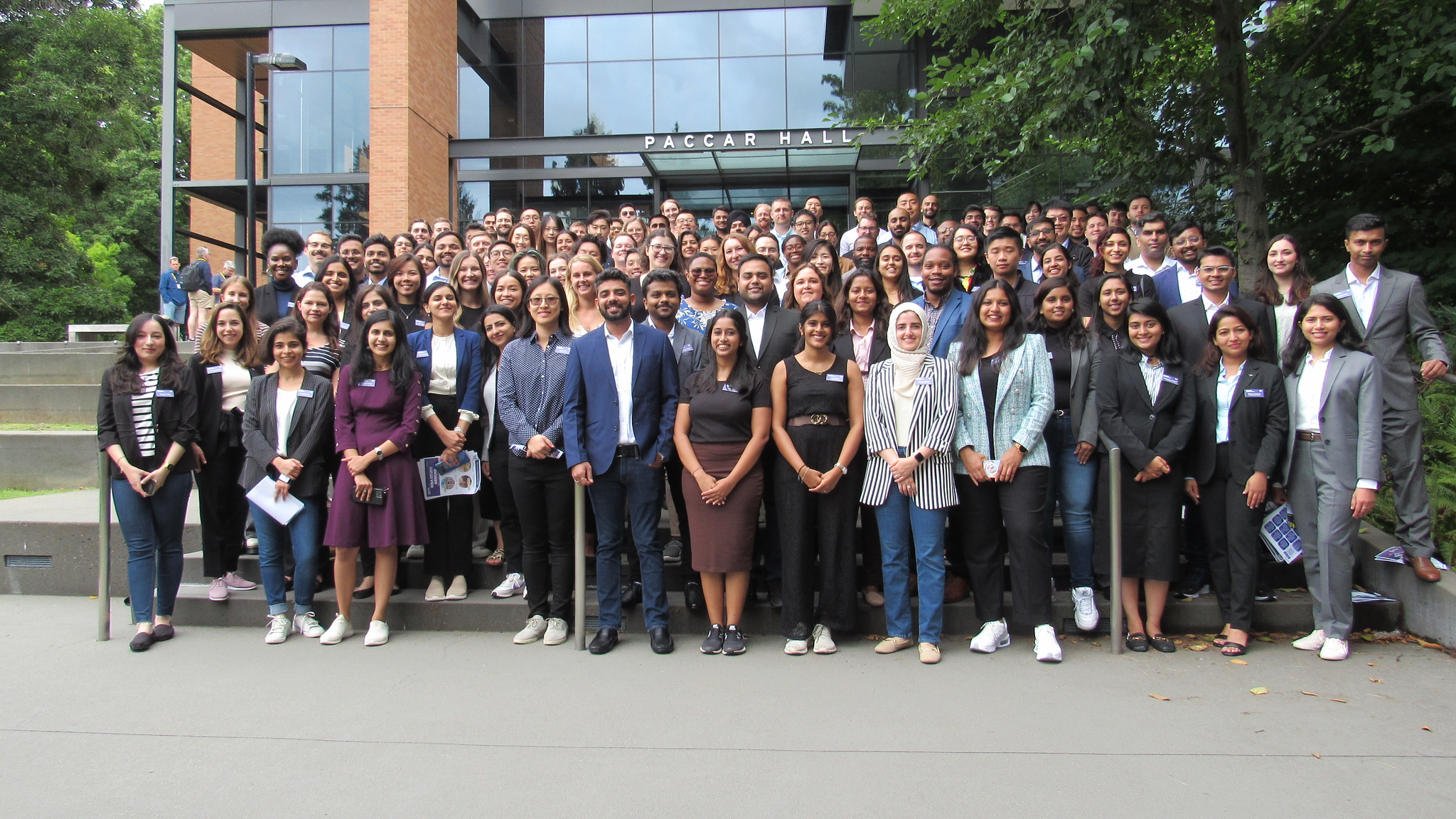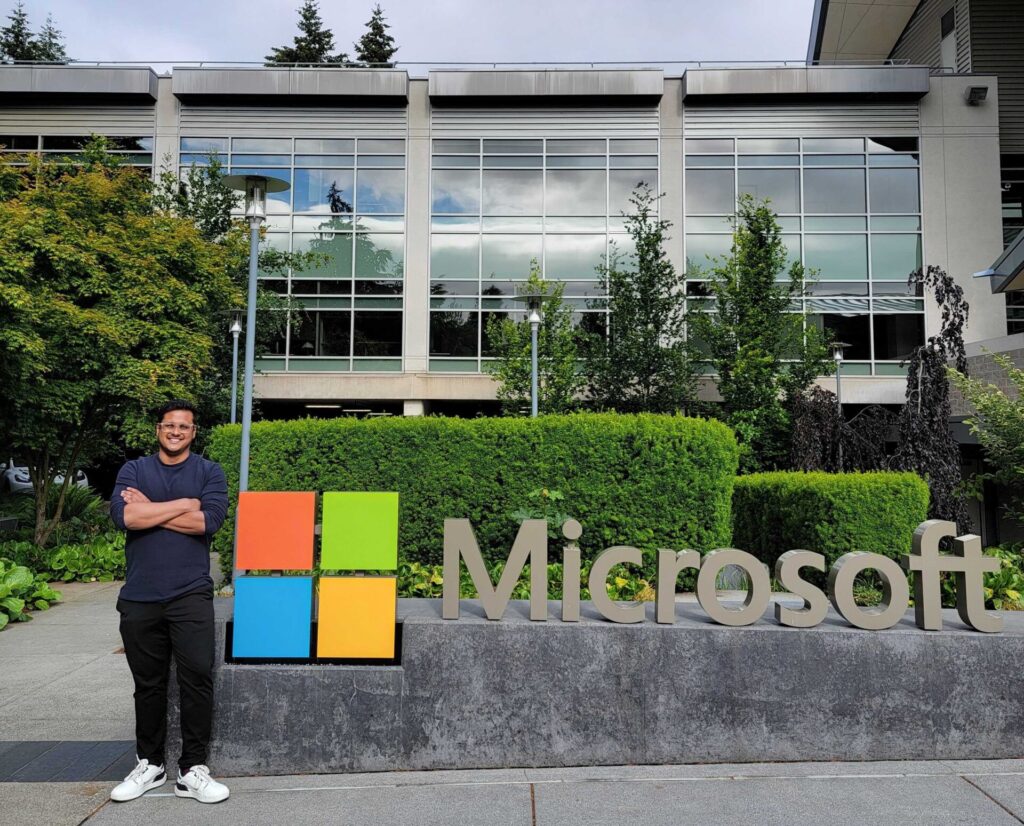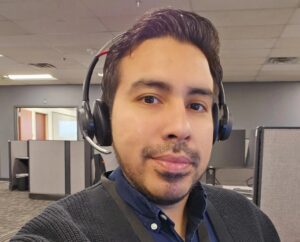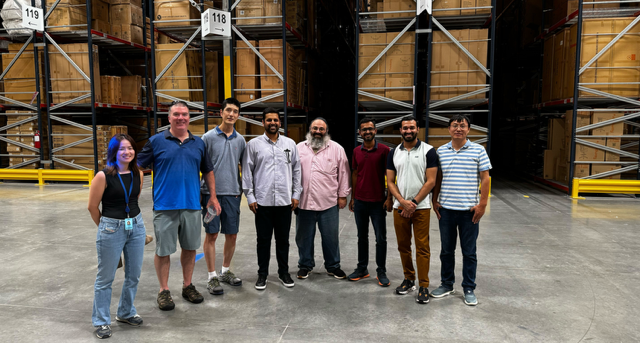
Foster MBAs Share Their Technology Internship Experiences
Foster Full-time MBA students describe what they learned from first-hand experiences at leading tech companies
This summer, Foster School of Business Full-Time MBA students from the class of 2025 gained experience across a range of tech companies, including major organizations including Amazon, Microsoft, Cisco, and Honeywell. We spoke with several students to learn more about their internship experiences and the paths that led them there.
 Yulei Wang interned as a Senior Product Manager at Amazon within the Supply Chain Optimization Org. Prior to her MBA, Yulei founded her own cosmetic brand in China with over $1 million in revenue. She also spent four years in investment banking, assisting multinational industry leaders with mergers and acquisitions.
Yulei Wang interned as a Senior Product Manager at Amazon within the Supply Chain Optimization Org. Prior to her MBA, Yulei founded her own cosmetic brand in China with over $1 million in revenue. She also spent four years in investment banking, assisting multinational industry leaders with mergers and acquisitions.
 Sarthak Agrawal interned as a Technical Program Manager at Microsoft. Sarthak has a computer science background and worked as a software engineer in the aviation industry prior to his MBA.
Sarthak Agrawal interned as a Technical Program Manager at Microsoft. Sarthak has a computer science background and worked as a software engineer in the aviation industry prior to his MBA.
 Saadhika Dua interned as a Product Manager at Cisco. With a degree in computer science, she worked as a Product Development Lead at SAP in her pre-MBA role.
Saadhika Dua interned as a Product Manager at Cisco. With a degree in computer science, she worked as a Product Development Lead at SAP in her pre-MBA role.
 Felipe Reyna interned as a Product Manager at Honeywell Aerospace. Before coming to Foster, Felipe drove business growth and global initiatives across Toshiba, Greenheck Fan and HMS networks. He has a background in Electrical Engineering from UT Austin.
Felipe Reyna interned as a Product Manager at Honeywell Aerospace. Before coming to Foster, Felipe drove business growth and global initiatives across Toshiba, Greenheck Fan and HMS networks. He has a background in Electrical Engineering from UT Austin.
The students detail their internship search process, available resources for MBAs, internship experiences, recruiting tips and Foster’s role in shaping their skills.
Which industries did you target? And how was the internship search process?
Saadhika Dua: I targeted the tech industry for my internship, aiming to transition into Product Management post-MBA, leveraging my background in software. The internship search process was a balancing act between attending classes, completing assignments, applying for roles, and preparing for interviews. I focused on tailoring my contributions to align with the product management role.
What helped me most was talking to second-year MBAs who had gone through similar experiences. They provided valuable insights and helped me develop the skill of balancing technical details with the broader impact — key to excelling in product management.
Yulei Wang: I primarily targeted tech-based companies for my job search, including both large and medium-sized firms, as well as startups in areas of personal interest. With my background in e-commerce, product development, and marketing, I focused on roles in product management (PM) and product marketing management (PMM). My interview invitations came later than some peers, with most arriving around January, and the wait was nerve-wracking, especially given the challenging market conditions in 2023. Looking back at my application tracking spreadsheet, I submitted 69 applications and received 24 rejections. Finally, my efforts paid off — I got interview invitations for PM roles at e-commerce giants like Amazon and Walmart, and PMM roles at Microsoft.
Which MBA Career Management events, programs, or services did you find most helpful?
Felipe Reyna: I found the company visits organized by MBA Career Management to be especially valuable. These visits provided firsthand exposure to various industries, allowed me to connect directly with professionals, and helped me better understand the roles available to MBA graduates. Additionally, the resume workshops and one-on-one support were instrumental in refining my resume to highlight my skills effectively, ensuring it aligned with my career goals in product management.
Yulei Wang: Career coaching sessions were tremendously helpful for me. Despite having seven years of work experience and conducting numerous interviews myself, presenting my own brand in a succinct and compelling way wasn’t easy. These sessions were invaluable in refining my narrative, highlighting what makes me unique, and connecting the dots — especially when it came to articulating the “why” behind my life and career choices. Those “whys” turned out to be the most critical aspects in demonstrating self-awareness and my decision-making processes.
How was your overall internship structured, and what were the major deliverables?
Felipe Reyna: My internship at Honeywell Aerospace was structured to provide comprehensive experience in product management. I worked closely with two product managers in that group and reported to both. I also worked closely with cross-functional teams such as marketing, engineering, and finance to develop the go-to-market strategies for a new product line. My key deliverables were:
- Market analysis and strategy developed based on conducting competitive analysis with a focus on new entrants such as Starlink, and identifying market needs to shape an effective go-to-market approach.
- Developed a pricing structure that accounted for the evolving market demands and competitor positioning.
- Presented findings and recommendations to project stakeholders (senior leadership) emphasizing strategic opportunities and expected market impact.
Sarthak Agrawal: I was responsible for two major deliverables. These included a go-to-market and pricing analysis for a new product, as well as a technical product development roadmap for its next iteration. I worked across finance, engineering, product, legal, marketing teams and it was crucial to get all stakeholders to align on my proposed vision. Ultimately, I presented my deliverables to the leadership team.

Tell us about some of the challenges you faced and how you overcame them.
Saadhika Dua: One of the key skills I developed during my internship was the ability to adapt to changing circumstances and embrace ambiguity. My project’s boundary conditions were constantly evolving, so I had to remain flexible and find ways to keep progressing. Another important skill was learning how to collaborate effectively with cross-functional teams. At Cisco, product managers work closely with engineering, solution engineers, and technical marketing engineers to align on customer needs and industry trends. Building relationships across different functions allowed me to validate my findings early on and make necessary adjustments, which helped me stay on track.
Yulei Wang: The ambiguity and constantly shifting dynamics of the project were challenging. I went beyond my initial stakeholder list to connect with numerous people, building trust through in-person meetings — rare in today’s virtual environment — or by finding mutual connections to facilitate introductions.
Interestingly, I used SQL extensively for data collection and analysis throughout the internship. The Data Management class during Spring Quarter was very helpful. Additionally, my extracurricular self-study in Python and AI enabled me to quickly grasp and effectively collaborate on complex machine learning models and programs developed by the data scientists and engineers on the team.
Sarthak Agrawal: One challenge I encountered was effectively merging my developer background with the new skills and knowledge gained from my MBA classes. I found that the Managerial Accounting class by Darren Bernard and Marketing by Scott Wallace were especially helpful in bridging this gap.
Felipe Reyna: During my internship at Honeywell Aerospace, one of the main challenges was developing a competitive pricing strategy in a market that was rapidly evolving with the entry of strong competitors. Balancing profitability with market competitiveness requires a deep understanding of pricing dynamics and competitor analysis. It helped me build several skills, including data-driven decision-making, strategic analysis, and effective stakeholder communication. I also gained practical experience in managing ambiguity and adapting strategies based on real-time market feedback.
First-year MBA subjects, especially Marketing and Finance, were incredibly helpful in my internship. Marketing provided the tools I needed to assess competitive positioning, market segmentation and market entry tactics, while Finance allowed me to approach pricing with a clear understanding of cost structures and profitability impact.
How would you describe the culture of the organization? Did you have good mentors? And did you meet colleagues or other MBA students from peer schools you plan to stay in touch with post internship?

Saadhika Dua: Cisco’s culture is incredibly collaborative and supportive. My team was always available to help, no matter how basic the question, which made the learning process smooth and rewarding. I also took the initiative to do some cold outreach, and the responses were consistently positive, reflecting Cisco’s openness to fostering connections.
Cisco organizes several events for interns to immerse themselves in the community. Over the summer, I had the chance to bond with other interns through coffee chats, lunches, and exchanging restaurant recommendations in the Bay Area. We’ve continued to stay in touch, and I’m confident those relationships will last well beyond the internship!
Sarthak Agrawal: Microsoft fosters a warm and supportive culture that emphasizes growth and learning. I had the privilege of working with excellent mentors and colleagues and meeting other MBA students from peer schools like NYU Stern, Chicago Booth and Northwestern Kellogg. I intend to maintain these connections post-internship. One particularly memorable experience from my internship was bonding with colleagues during Mariners baseball game nights. These events provided a fun and casual environment for building relationships outside of work.
What are your plans for the second year of MBA? Anything you’re looking forward to?
Yulei Wang: In my second year, I’ve become more involved in Seattle’s startup and entrepreneurship scene. I’m taking the Angel Investing class, where students are placed with a venture fund or angel association to gain real, hands-on experience. I’ve already had the chance to speak with several founders about their startups, which has inspired me to think deeply about how I can leverage my experience and skills to craft a meaningful product in the AI era.
Saadhika Dua: I plan to focus on deepening my expertise in product management while also exploring electives that align with my interests in technology and innovation. I’m particularly excited about the marketing analytics and product marketing specializations as these will help me build a well-rounded skill set. I’m also committed to giving back to the Foster community through avenues like the Data & Analytics Club I am leading and sharing my experience and learnings, to be able to help others navigate their own journeys, just as I got support from those ahead of me.

What advice do you have for first year students regarding summer internships?
Sarthak Agrawal: I advise applying for positions as early as possible and taking full advantage of the Foster network. Building relationships and gaining support from within the community can greatly enhance your chances of securing the right internship.
Felipe Reyna: Keep your eye on the prize! While it’s beneficial to explore different companies and sectors, it’s essential to have a clear idea of what you truly want to pursue. Focus your time and energy on roles and industries that align with your goals. Be patient and resilient, the interview process can be intense and sometimes discouraging. Keep pushing forward and prepare thoroughly for each interview. Leverage all the resources Foster provides. If you give it your best, you can feel confident knowing that you controlled the part of the equation within your reach.
Learn more about the Foster School of Business MBA program.
